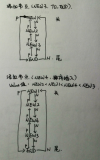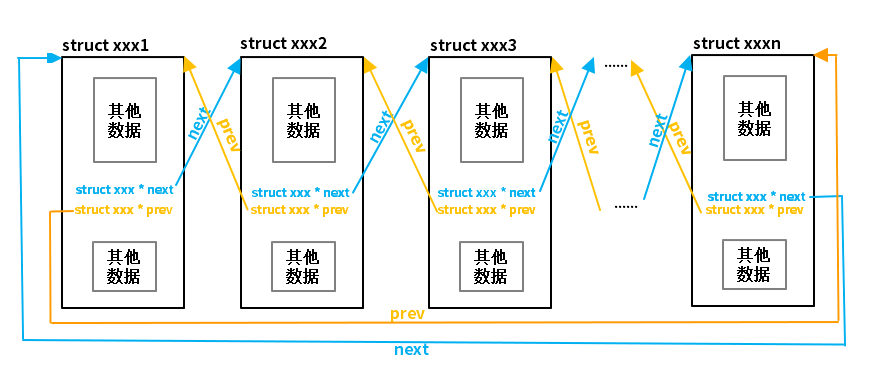Linux内核中,有许许多多的精妙设计,比如在内核代码中,运用到了大量的【链表】这种数据结构,而在Linux内核中,针对如此多的链表要进行操作,他们分别是如何定义和管理的呢?本文将给你展示,Linux内核中list.h的高效应用。
通过本文的阅读,你将了解到以下内容:
- list.h的全貌
- **如何使用list.h创建单向链表并实现链表的基本操作?
list.h的全貌
以下就是它的全部内容,可能不同版本的linux有些许的差异,但精髓都在这:
#ifndef _LINUX_LIST_H
#define _LINUX_LIST_H
/********** include/linux/list.h **********/
/*
* These are non-NULL pointers that will result in page faults
* under normal circumstances, used to verify that nobody uses
* non-initialized list entries.
*/
#define LIST_POISON1 ((void *) 0x00100100)
#define LIST_POISON2 ((void *) 0x00200200)
#ifndef ARCH_HAS_PREFETCH
#define ARCH_HAS_PREFETCH
static inline void prefetch(const void *x) {;}
#endif
/*
* Simple doubly linked list implementation.
*
* Some of the internal functions ("__xxx") are useful when
* manipulating whole lists rather than single entries, as
* sometimes we already know the next/prev entries and we can
* generate better code by using them directly rather than
* using the generic single-entry routines.
*/
struct list_head {
struct list_head *next, *prev;
};
#define LIST_HEAD_INIT(name) { &(name), &(name) }
#define LIST_HEAD(name) \
struct list_head name = LIST_HEAD_INIT(name)
/**
* container_of - cast a member of a structure out to the containing structure
* @ptr: the pointer to the member.
* @type: the type of the container struct this is embedded in.
* @member: the name of the member within the struct.
*
*/
#ifndef offsetof
#define offsetof(TYPE, MEMBER) ((size_t) &((TYPE *)0)->MEMBER)
#endif
#define container_of(ptr, type, member) ({ \
const typeof( ((type *)0)->member ) *__mptr = (ptr); \
(type *)( (char *)__mptr - offsetof(type,member) );})
static inline void INIT_LIST_HEAD(struct list_head *list)
{
list->next = list;
list->prev = list;
}
/*
* Insert a new entry between two known consecutive entries.
*
* This is only for internal list manipulation where we know
* the prev/next entries already!
*/
#ifndef CONFIG_DEBUG_LIST
static inline void __list_add(struct list_head *new,
struct list_head *prev,
struct list_head *next)
{
next->prev = new;
new->next = next;
new->prev = prev;
prev->next = new;
}
#else
extern void __list_add(struct list_head *new,
struct list_head *prev,
struct list_head *next);
#endif
/**
* list_add - add a new entry
* @new: new entry to be added
* @head: list head to add it after
*
* Insert a new entry after the specified head.
* This is good for implementing stacks.
*/
#ifndef CONFIG_DEBUG_LIST
static inline void list_add(struct list_head *new, struct list_head *head)
{
__list_add(new, head, head->next);
}
#else
extern void list_add(struct list_head *new, struct list_head *head);
#endif
/**
* list_add_tail - add a new entry
* @new: new entry to be added
* @head: list head to add it before
*
* Insert a new entry before the specified head.
* This is useful for implementing queues.
*/
static inline void list_add_tail(struct list_head *new, struct list_head *head)
{
__list_add(new, head->prev, head);
}
/*
* Delete a list entry by making the prev/next entries
* point to each other.
*
* This is only for internal list manipulation where we know
* the prev/next entries already!
*/
static inline void __list_del(struct list_head * prev, struct list_head * next)
{
next->prev = prev;
prev->next = next;
}
/**
* list_del - deletes entry from list.
* @entry: the element to delete from the list.
* Note: list_empty() on entry does not return true after this, the entry is
* in an undefined state.
*/
#ifndef CONFIG_DEBUG_LIST
static inline void list_del(struct list_head *entry)
{
__list_del(entry->prev, entry->next);
entry->next = LIST_POISON1;
entry->prev = LIST_POISON2;
}
#else
extern void list_del(struct list_head *entry);
#endif
/**
* list_replace - replace old entry by new one
* @old : the element to be replaced
* @new : the new element to insert
*
* If @old was empty, it will be overwritten.
*/
static inline void list_replace(struct list_head *old,
struct list_head *new)
{
new->next = old->next;
new->next->prev = new;
new->prev = old->prev;
new->prev->next = new;
}
static inline void list_replace_init(struct list_head *old,
struct list_head *new)
{
list_replace(old, new);
INIT_LIST_HEAD(old);
}
/**
* list_del_init - deletes entry from list and reinitialize it.
* @entry: the element to delete from the list.
*/
static inline void list_del_init(struct list_head *entry)
{
__list_del(entry->prev, entry->next);
INIT_LIST_HEAD(entry);
}
/**
* list_move - delete from one list and add as another's head
* @list: the entry to move
* @head: the head that will precede our entry
*/
static inline void list_move(struct list_head *list, struct list_head *head)
{
__list_del(list->prev, list->next);
list_add(list, head);
}
/**
* list_move_tail - delete from one list and add as another's tail
* @list: the entry to move
* @head: the head that will follow our entry
*/
static inline void list_move_tail(struct list_head *list,
struct list_head *head)
{
__list_del(list->prev, list->next);
list_add_tail(list, head);
}
/**
* list_is_last - tests whether @list is the last entry in list @head
* @list: the entry to test
* @head: the head of the list
*/
static inline int list_is_last(const struct list_head *list,
const struct list_head *head)
{
return list->next == head;
}
/**
* list_empty - tests whether a list is empty
* @head: the list to test.
*/
static inline int list_empty(const struct list_head *head)
{
return head->next == head;
}
/**
* list_empty_careful - tests whether a list is empty and not being modified
* @head: the list to test
*
* Description:
* tests whether a list is empty _and_ checks that no other CPU might be
* in the process of modifying either member (next or prev)
*
* NOTE: using list_empty_careful() without synchronization
* can only be safe if the only activity that can happen
* to the list entry is list_del_init(). Eg. it cannot be used
* if another CPU could re-list_add() it.
*/
static inline int list_empty_careful(const struct list_head *head)
{
struct list_head *next = head->next;
return (next == head) && (next == head->prev);
}
static inline void __list_splice(struct list_head *list,
struct list_head *head)
{
struct list_head *first = list->next;
struct list_head *last = list->prev;
struct list_head *at = head->next;
first->prev = head;
head->next = first;
last->next = at;
at->prev = last;
}
/**
* list_splice - join two lists
* @list: the new list to add.
* @head: the place to add it in the first list.
*/
static inline void list_splice(struct list_head *list, struct list_head *head)
{
if (!list_empty(list))
__list_splice(list, head);
}
/**
* list_splice_init - join two lists and reinitialise the emptied list.
* @list: the new list to add.
* @head: the place to add it in the first list.
*
* The list at @list is reinitialised
*/
static inline void list_splice_init(struct list_head *list,
struct list_head *head)
{
if (!list_empty(list)) {
__list_splice(list, head);
INIT_LIST_HEAD(list);
}
}
/**
* list_entry - get the struct for this entry
* @ptr: the &struct list_head pointer.
* @type: the type of the struct this is embedded in.
* @member: the name of the list_struct within the struct.
*/
#define list_entry(ptr, type, member) \
container_of(ptr, type, member)
/**
* list_first_entry - get the first element from a list
* @ptr: the list head to take the element from.
* @type: the type of the struct this is embedded in.
* @member: the name of the list_struct within the struct.
*
* Note, that list is expected to be not empty.
*/
#define list_first_entry(ptr, type, member) \
list_entry((ptr)->next, type, member)
/**
* list_for_each - iterate over a list
* @pos: the &struct list_head to use as a loop cursor.
* @head: the head for your list.
*/
#define list_for_each(pos, head) \
for (pos = (head)->next; prefetch(pos->next), pos != (head); \
pos = pos->next)
/**
* __list_for_each - iterate over a list
* @pos: the &struct list_head to use as a loop cursor.
* @head: the head for your list.
*
* This variant differs from list_for_each() in that it's the
* simplest possible list iteration code, no prefetching is done.
* Use this for code that knows the list to be very short (empty
* or 1 entry) most of the time.
*/
#define __list_for_each(pos, head) \
for (pos = (head)->next; pos != (head); pos = pos->next)
/**
* list_for_each_prev - iterate over a list backwards
* @pos: the &struct list_head to use as a loop cursor.
* @head: the head for your list.
*/
#define list_for_each_prev(pos, head) \
for (pos = (head)->prev; prefetch(pos->prev), pos != (head); \
pos = pos->prev)
/**
* list_for_each_prev_safe - iterate over a list safe against removal of list entry backwards
* @pos: the &struct list_head to use as a loop cursor.
* @n: another &struct list_head to use as temporary storage
* @head: the head for your list.
*/
#define list_for_each_prev_safe(pos, n, head) \
for (pos = (head)->prev, n = pos->prev; prefetch(pos->prev), pos != (head); \
pos =n, n = pos->prev)
/**
* list_for_each_safe - iterate over a list safe against removal of list entry
* @pos: the &struct list_head to use as a loop cursor.
* @n: another &struct list_head to use as temporary storage
* @head: the head for your list.
*/
#define list_for_each_safe(pos, n, head) \
for (pos = (head)->next, n = pos->next; pos != (head); \
pos = n, n = pos->next)
/**
* list_for_each_entry - iterate over list of given type
* @pos: the type * to use as a loop cursor.
* @head: the head for your list.
* @member: the name of the list_struct within the struct.
*/
#define list_for_each_entry(pos, head, member) \
for (pos = list_entry((head)->next, typeof(*pos), member); \
prefetch(pos->member.next), &pos->member != (head); \
pos = list_entry(pos->member.next, typeof(*pos), member))
/**
* list_for_each_entry_reverse - iterate backwards over list of given type.
* @pos: the type * to use as a loop cursor.
* @head: the head for your list.
* @member: the name of the list_struct within the struct.
*/
#define list_for_each_entry_reverse(pos, head, member) \
for (pos = list_entry((head)->prev, typeof(*pos), member); \
prefetch(pos->member.prev), &pos->member != (head); \
pos = list_entry(pos->member.prev, typeof(*pos), member))
/**
* list_prepare_entry - prepare a pos entry for use in list_for_each_entry_continue()
* @pos: the type * to use as a start point
* @head: the head of the list
* @member: the name of the list_struct within the struct.
*
* Prepares a pos entry for use as a start point in list_for_each_entry_continue().
*/
#define list_prepare_entry(pos, head, member) \
((pos) ? : list_entry(head, typeof(*pos), member))
/**
* list_for_each_entry_continue - continue iteration over list of given type
* @pos: the type * to use as a loop cursor.
* @head: the head for your list.
* @member: the name of the list_struct within the struct.
*
* Continue to iterate over list of given type, continuing after
* the current position.
*/
#define list_for_each_entry_continue(pos, head, member) \
for (pos = list_entry(pos->member.next, typeof(*pos), member); \
prefetch(pos->member.next), &pos->member != (head); \
pos = list_entry(pos->member.next, typeof(*pos), member))
/**
* list_for_each_entry_from - iterate over list of given type from the current point
* @pos: the type * to use as a loop cursor.
* @head: the head for your list.
* @member: the name of the list_struct within the struct.
*
* Iterate over list of given type, continuing from current position.
*/
#define list_for_each_entry_from(pos, head, member) \
for (; prefetch(pos->member.next), &pos->member != (head); \
pos = list_entry(pos->member.next, typeof(*pos), member))
/**
* list_for_each_entry_safe - iterate over list of given type safe against removal of list entry
* @pos: the type * to use as a loop cursor.
* @n: another type * to use as temporary storage
* @head: the head for your list.
* @member: the name of the list_struct within the struct.
*/
#define list_for_each_entry_safe(pos, n, head, member) \
for (pos = list_entry((head)->next, typeof(*pos), member), \
n = list_entry(pos->member.next, typeof(*pos), member); \
&pos->member != (head); \
pos = n, n = list_entry(n->member.next, typeof(*n), member))
/**
* list_for_each_entry_safe_continue
* @pos: the type * to use as a loop cursor.
* @n: another type * to use as temporary storage
* @head: the head for your list.
* @member: the name of the list_struct within the struct.
*
* Iterate over list of given type, continuing after current point,
* safe against removal of list entry.
*/
#define list_for_each_entry_safe_continue(pos, n, head, member) \
for (pos = list_entry(pos->member.next, typeof(*pos), member), \
n = list_entry(pos->member.next, typeof(*pos), member); \
&pos->member != (head); \
pos = n, n = list_entry(n->member.next, typeof(*n), member))
/**
* list_for_each_entry_safe_from
* @pos: the type * to use as a loop cursor.
* @n: another type * to use as temporary storage
* @head: the head for your list.
* @member: the name of the list_struct within the struct.
*
* Iterate over list of given type from current point, safe against
* removal of list entry.
*/
#define list_for_each_entry_safe_from(pos, n, head, member) \
for (n = list_entry(pos->member.next, typeof(*pos), member); \
&pos->member != (head); \
pos = n, n = list_entry(n->member.next, typeof(*n), member))
/**
* list_for_each_entry_safe_reverse
* @pos: the type * to use as a loop cursor.
* @n: another type * to use as temporary storage
* @head: the head for your list.
* @member: the name of the list_struct within the struct.
*
* Iterate backwards over list of given type, safe against removal
* of list entry.
*/
#define list_for_each_entry_safe_reverse(pos, n, head, member) \
for (pos = list_entry((head)->prev, typeof(*pos), member), \
n = list_entry(pos->member.prev, typeof(*pos), member); \
&pos->member != (head); \
pos = n, n = list_entry(n->member.prev, typeof(*n), member))
#endif
[外链图片转存失败,源站可能有防盗链机制,建议将图片保存下来直接上传(img-M8VFnglD-1662859888636)(data:image/gif;base64,R0lGODlhAQABAPABAP///wAAACH5BAEKAAAALAAAAAABAAEAAAICRAEAOw==)]
如何使用list.h创建单向链表并实现链表的基本操作?
以下代码将为你展示如何创建单向链表,及实现单向链表的基本操作:创建、添加、查找、修改、删除等。
/******************************************************************
本文件借助linux_list.h实现【单向链表】的基本操作:
创建、添加、查找、修改、删除、销毁、打印等
******************************************************************/
#include
#include
#include
#include
#include "linux_list.h"
/** 查找链表的方向 */
#define LIST_FROM_HEAD_TO_TAIL 1
#define LIST_FROM_TAIL_TO_HEAD 0
/** 链表节点中存储的实际内容 */
typedef struct _data_node_t {
int index;
char msg[128];
} node_data_t;
/** 链表节点的对外数据类型定义 */
typedef struct _my_list_node_t {
node_data_t data;
struct list_head list;
} my_list_node_t ;
/** 定义链表的表头 */
static my_list_node_t g_list_head;
/** 定义链表当前的节点个数 */
static int g_list_node_cnt = 0;
/** 链表创建 */
int my_list_create(void)
{
INIT_LIST_HEAD(&g_list_head.list);
return 0;
}
/** 链表增加节点 */
int my_list_add_node(const node_data_t *data)
{
my_list_node_t *node;
node = (my_list_node_t *)malloc(sizeof(my_list_node_t));
if (!node) {
printf("memory error !\n");
return -1;
}
node->data.index = data->index;
snprintf(node->data.msg, sizeof(node->data.msg), "%s", data->msg);
list_add_tail(&node->list, &g_list_head.list);
g_list_node_cnt ++;
return 0;
}
/** 链表查找节点 */
my_list_node_t * my_list_query_node(const node_data_t *data)
{
struct list_head *pos,*n;
my_list_node_t *p;
list_for_each_safe(pos, n, &g_list_head.list)
{
p = list_entry(pos, my_list_node_t, list);
if((p->data.index == data->index) && (!strcmp((char*)p->data.msg, data->msg)))
{
//printf("found index=%d, msg=%s\n", data->index, data->msg);
return p;
}
}
return NULL;
}
/** 链表将一个节点的内容进行修改 */
int my_list_modify_node(const node_data_t *old_data, const node_data_t *new_data)
{
my_list_node_t *p = my_list_query_node(old_data);
if (p)
{
p->data.index = new_data->index;
snprintf(p->data.msg, sizeof(p->data.msg), "%s", new_data->msg);
return 0;
}
else
{
printf("Node index=%d, msg=%s, not found !\n", old_data->index, old_data->msg);
return -1;
}
}
/** 链表删除一个节点 */
int my_list_delete_node(const node_data_t *data)
{
my_list_node_t *p = my_list_query_node(data);
if (p)
{
struct list_head *pos = &p->list;
list_del(pos);
free(p);
g_list_node_cnt --;
return 0;
}
else
{
printf("Node index=%d, msg=%s, not found !\n", data->index, data->msg);
return -1;
}
}
/** 链表删除所有节点 */
int my_list_delete_all_node(void)
{
struct list_head *pos,*n;
my_list_node_t *p;
list_for_each_safe(pos, n, &g_list_head.list)
{
p = list_entry(pos, my_list_node_t, list);
list_del(pos);
free(p);
}
g_list_node_cnt = 0;
return 0;
}
/** 链表销毁 */
int my_list_destory(void)
{
/** do nothing here ! */
return 0;
}
/** 链表内容打印 */
int my_list_print(int print_index)
{
int i = 1;
struct list_head * pos,*n;
my_list_node_t * node;
printf("==================== %d ===========================\n", print_index);
printf("cur list data : g_list_node_cnt = %d \n", g_list_node_cnt);
list_for_each_safe(pos, n, &g_list_head.list) //调用linux_list.h中的list_for_each函数进行遍历
{
node = list_entry(pos, my_list_node_t, list); //调用list_entry函数得到相对应的节点
printf("Node %2d's : index=%-3d, msg=%-20s\n",
i++, node->data.index, node->data.msg);
}
printf("==================================================\n");
return 0;
}
int main(int argc, const char *argv[])
{
int retval = -1;
my_list_node_t *p;
const node_data_t data1 = {1, "a1bcde"};
const node_data_t data2 = {2, "ab2cde"};
const node_data_t data3 = {3, "abc3de"};
const node_data_t data4 = {4, "abcd4e"};
const node_data_t data5 = {5, "abcde5"};
const node_data_t data6 = {6, "abcde5666"}; // 定义一个不添加到链表的节点信息
const node_data_t data7 = {7, "abcde5777"}; // 定义一个被修改的节点信息
const node_data_t data8 = {8, "abcde5888"}; // 定义一个修改后的节点信息
/** 创建一个空链表 */
retval = my_list_create();
if (!retval) {
printf("list create ok !!!\n");
}
printf("\n\n\n");
/** 往链表的尾部添加6个节点 */
retval = my_list_add_node(&data1);
if (!retval) {
printf("node1 add ok !\n");
}
retval = my_list_add_node(&data2);
if (!retval) {
printf("node2 add ok !\n");
}
retval = my_list_add_node(&data3);
if (!retval) {
printf("node3 add ok !\n");
}
retval = my_list_add_node(&data4);
if (!retval) {
printf("node4 add ok !\n");
}
retval = my_list_add_node(&data5);
if (!retval) {
printf("node5 add ok !\n");
}
retval = my_list_add_node(&data7);
if (!retval) {
printf("node7 add ok !\n");
}
printf("\n\n\n");
/** 分别查询刚刚添加的前5个节点 */
p = my_list_query_node(&data1);
if (p) {
printf("node %d,%s, found !!!\n", data1.index, data1.msg);
}
p = my_list_query_node(&data2);
if (p) {
printf("node %d,%s, found !!!\n", data2.index, data2.msg);
}
p = my_list_query_node(&data3);
if (p) {
printf("node %d,%s, found !!!\n", data3.index, data3.msg);
}
p = my_list_query_node(&data4);
if (p) {
printf("node %d,%s, found !!!\n", data4.index, data4.msg);
}
p = my_list_query_node(&data5);
if (p) {
printf("node %d,%s, found !!!\n", data5.index, data5.msg);
}
/** 查询一个没有添加到链表中的节点,即不存在的节点 */
p = my_list_query_node(&data6);
if (!p) {
printf("node %d,%s, found fail !!!\n", data6.index, data6.msg);
}
/** 打印当前链表的节点信息 */
printf("\n\n\n");
my_list_print(1);
printf("\n\n\n");
/** 将data7的信息修改为data8的内容 */
retval = my_list_modify_node(&data7, &data8);
if (!retval) {
printf("node %d,%s => %d,%s, modify ok !!!\n", data7.index, data7.msg, data8.index, data8.msg);
} else {
printf("node %d,%s => %d,%s, modify fail !!!\n", data7.index, data7.msg, data8.index, data8.msg);
}
/** 查询刚刚被修改了的节点data7,即不存在的节点 */
p = my_list_query_node(&data7);
if (!p) {
printf("node %d,%s, found fail !!!\n", data7.index, data7.msg);
}
/** 查询刚刚被修改后的节点data8,即存在的节点 */
p = my_list_query_node(&data8);
if (p) {
printf("node %d,%s, found ok !!!\n", data8.index, data8.msg);
}
/** 打印当前链表的节点信息 */
printf("\n\n\n");
my_list_print(2);
printf("\n\n\n");
/** 删除一个存在于链表中的节点 */
retval = my_list_delete_node(&data4);
if (!retval) {
printf("node %d,%s, delete ok !!!\n", data4.index, data4.msg);
}
printf("\n\n\n");
/** 再次查询刚刚已删除的节点 */
p = my_list_query_node(&data4);
if (p) {
printf("node %d,%s, found ok !!!\n", data4.index, data4.msg);
} else {
printf("node %d,%s, found fail !!!\n", data4.index, data4.msg);
}
printf("\n\n\n");
/** 删除一个不存在于链表中的节点 */
retval = my_list_delete_node(&data6);
if (retval) {
printf("node %d,%s, delete fail !!!\n", data6.index, data6.msg);
}
/** 打印当前链表的节点信息 */
printf("\n\n\n");
my_list_print(3);
printf("\n\n\n");
/** 删除链表的所有节点 */
retval = my_list_delete_all_node();
if (!retval) {
printf("all list notes delete done !\n");
}
/** 打印当前链表的节点信息 */
printf("\n\n\n");
my_list_print(4);
printf("\n\n\n");
/** 销毁链表 */
retval = my_list_destory();
if (!retval) {
printf("list destory done !\n");
}
/** 打印当前链表的节点信息 */
printf("\n\n\n");
my_list_print(5);
printf("\n\n\n");
return retval;
}
[外链图片转存失败,源站可能有防盗链机制,建议将图片保存下来直接上传(img-7r1QKtXf-1662859888641)(data:image/gif;base64,R0lGODlhAQABAPABAP///wAAACH5BAEKAAAALAAAAAABAAEAAAICRAEAOw==)]
示例代码比较简单,相关代码都有详尽注释,我们整理下main函数里面的操作:
先创建一个空的链表,接着往链表添加6个节点,接着查询前5个节点,查询一个不存在的节点,将最后一个节点的信息做修改,查找刚刚被修改前的节点及被修改后的节点,删除一个存在于链表的节点,接着查询这个被删除的节点,删除一个不存在于链表中的节点,删除所有节点,销毁链表。期间有打印各个时间段的链表节点情况,可供参考。
跑出的结果如下:
root@liluchang-ubuntu:/share/llc/linux_list# ./linux_list
list create ok !!!
node1 add ok !
node2 add ok !
node3 add ok !
node4 add ok !
node5 add ok !
node7 add ok !
node 1,a1bcde, found !!!
node 2,ab2cde, found !!!
node 3,abc3de, found !!!
node 4,abcd4e, found !!!
node 5,abcde5, found !!!
node 6,abcde5666, found fail !!!
==================== 1 ===========================
cur list data : g_list_node_cnt = 6
Node 1's : index=1 , msg=a1bcde
Node 2's : index=2 , msg=ab2cde
Node 3's : index=3 , msg=abc3de
Node 4's : index=4 , msg=abcd4e
Node 5's : index=5 , msg=abcde5
Node 6's : index=7 , msg=abcde5777
==================================================
node 7,abcde5777 => 8,abcde5888, modify ok !!!
node 7,abcde5777, found fail !!!
node 8,abcde5888, found ok !!!
==================== 2 ===========================
cur list data : g_list_node_cnt = 6
Node 1's : index=1 , msg=a1bcde
Node 2's : index=2 , msg=ab2cde
Node 3's : index=3 , msg=abc3de
Node 4's : index=4 , msg=abcd4e
Node 5's : index=5 , msg=abcde5
Node 6's : index=8 , msg=abcde5888
==================================================
node 4,abcd4e, delete ok !!!
node 4,abcd4e, found fail !!!
Node index=6, msg=abcde5666, not found !
node 6,abcde5666, delete fail !!!
==================== 3 ===========================
cur list data : g_list_node_cnt = 5
Node 1's : index=1 , msg=a1bcde
Node 2's : index=2 , msg=ab2cde
Node 3's : index=3 , msg=abc3de
Node 4's : index=5 , msg=abcde5
Node 5's : index=8 , msg=abcde5888
==================================================
all list notes delete done !
==================== 4 ===========================
cur list data : g_list_node_cnt = 0
==================================================
list destory done !
==================== 5 ===========================
cur list data : g_list_node_cnt = 0
==================================================
从测试的结果看,所有链表的操作均得到了正确的结果。
好了,本次关于Linux内核的list.h在单向链表中的应用,就介绍到这里,如果有疑问,欢迎在评论席提出。感谢您的阅读。
-
Linux
+关注
关注
87文章
11314浏览量
209771 -
编译
+关注
关注
0文章
659浏览量
32898 -
链表
+关注
关注
0文章
80浏览量
10572
发布评论请先 登录
相关推荐
OpenHarmony语言基础类库【@ohos.util.List (线性容器List)】

Linux Kernel数据结构:链表
RT-Thread内核中双链表的使用与实现
如何去实现一种基于Rust的单向链表设计呢
深入浅出linux内核源代码之双向链表list_head说明文档
FreeRTOS代码剖析之5:链表管理list.c

了解Linux通用的双向循环链表
你知道Linux内核数据结构中双向链表的作用?
linux内核中llist.h文件中的链表宏讲解
关于llist.h文件中的链表宏讲解
什么是list?
LinkedBlockingQueue基于单向链表的实现





 【Linux高级编译】list.h的高效应用—单向链表的实现
【Linux高级编译】list.h的高效应用—单向链表的实现












评论